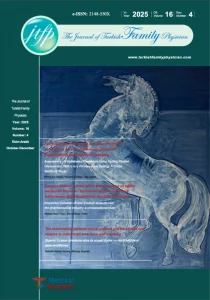Active Ageing: Cognitive and Social Aspect
Aging is defined as a period in which the decline of the capacity and the opportunities especially about the social, cognitive and psychologic functions overbalance the progress. The active aging is a procedure in which the aging individual improves and goes on with focusing on the strengths more than the losses and individual characteristics stand out. It is known that individuals do not feel themselves good, especially with concentration, memory, visual and auditory perceptions, administrative skills and language subjects through aging and in some people this cognitive impairment may present at the minimum level that we accept as successful/active cognitive aging but in some others it may progress to a dementia. Thus by active aging process it is aimed to live the added extra years of life expectancy at the maximum possible quality and to keep the cognitive decline at the minimum. The absence of disease and disabling conditions, maintaining physical and cognitive capacities, and the active involvement of seniors in society (keeping on the interpersonal relationships and social roles) are listed as the essential requirements for active aging. Attributes like engagement in social voluntary work, protection of present relations and roles, come together with the similiar age groups, feeling family members and friends understand and accept them, involve in trainings to get new knowledge and skills mean to promote and prevention of cognitive functions. So they are the characteristics that achive active cognitive aging.
References
- Aiken RL. Aging. An Introduction to Gerontology. Thousand Oaks, CA ABD. Sage Publications, 1995:2.
- Active Ageing A Policy Framework. [http://whqlibdoc.who.int/hq/2002/WHO_NMH_NPH_02.8.pdf] adresinden 18/04/2012 tarihinde erişilmiştir.
- Cangöz B. Yaşlılıkta Bilişsel Ve Psikolojik Değişim. [http://www.e-kutuphane.teb.org.tr/pdf/tebakademi/geriatri_2009/19.pdf] adresinden 04.06.2012 tarihinde erişilmiştir
- Petersen RC: Mild cognitive impairement: Continuum. Dementia 2004;10: 9-28.
- Lievre A, Jusot F, Barnayı T, Sermet C, Broud N, Robine JM, Brieus MA, Forette F. Healthy working life expectancies at age 50 in Europe: A new indicator . The J Nutr Health Aging 2007;11(6):508-513.
- Consilium Europa. Stockholm European Council: presidency conclusions, 24/03/2001 n°100/1/2001. consilium europa 2007; [URL:http://www.consilium.europa.eu/ueDocs/cms_Data/docs/pressData/en/ec/00100-r1.%20ann-r1.en1.html] adresinden 04.06.2012 tarihinde erişilmiştir.
- Nayak R, Buys L, Lovie-Kitchin JE. Influencing factors in achieving active ageing. In Proceedings 6th IEEE International Conference on Data Mining – Workshops (ICDMW) Hong Kong 2006:858-862.
- Boulton-Lewis GM, Buys L, Lovie-Kitchin J. Learning and active aging. Educational Gerontology 2006;32(4):271-282.
- Buys L, Boulton-Lewis G, Tedman-Jones J, Edwards H, Knox M, Bigby C. Issues of active ageing: Perceptions of older people with lifelong intellectual disability. Australas J Ageing 2008;27(2): 67–71.
- Sirven N, Debrand T. Social participation and healthy ageing: An international comparison using SHARE data. Social Science & Medicine 2008; 67:2017-2026.
- Greaves CJ, Farbus L. Effects of creative and social activity on the health and well-being of socially isolated older people: outcomes from a multi-method observational study. J R Soc Promot Health 2006; 126(3): 134-142.
- McNeill G, Avenell A, Campbell MK, Cook JA, Hannaford PC, Kilonzo MM, Milne AC, Ramsay CR, Seymour DG, Stephen AI, Vale LD. Effect of multivitamin and multimineral supplementation on cognitive function in men and women aged 65 years and over: a randomised controlled trial. Nutrition Journal Nutr J. 2007;6:10.



